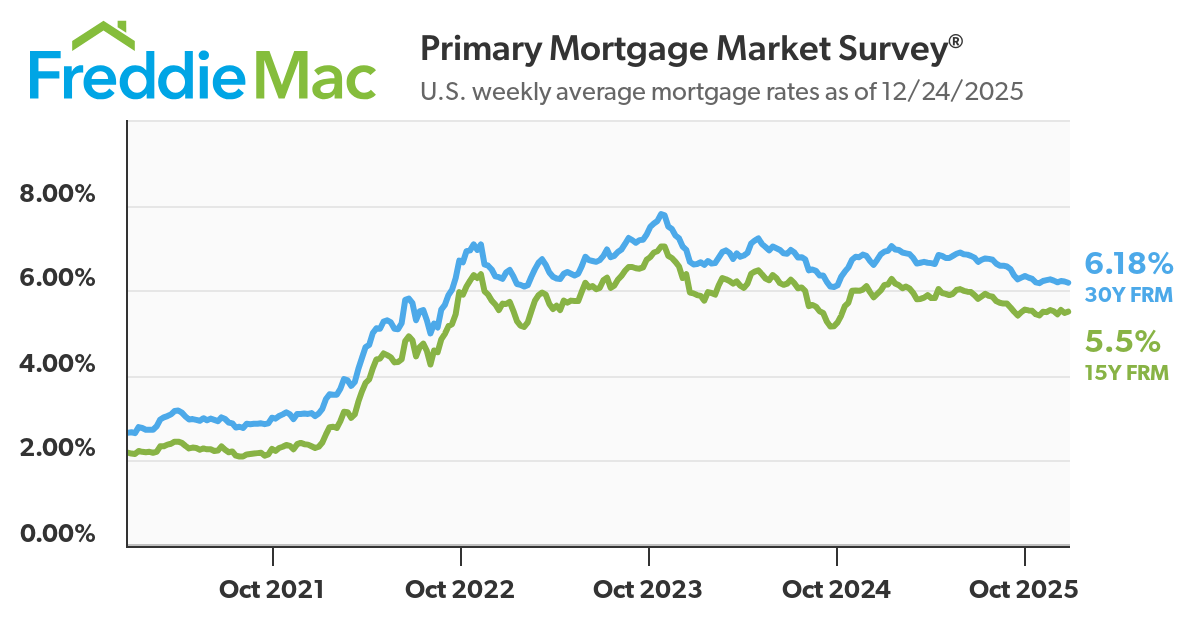With the Fed Rate Cut, Should You Sell Your House Now or Wait?
Mortgage rates are drifting down, but high prices and limited inventory complicate the sell-or-wait decision.

Kathryn Pomroy
Profit and prosper with the best of Kiplinger's advice on investing, taxes, retirement, personal finance and much more. Delivered daily. Enter your email in the box and click Sign Me Up.
You are now subscribed
Your newsletter sign-up was successful
Want to add more newsletters?

Delivered daily
Kiplinger Today
Profit and prosper with the best of Kiplinger's advice on investing, taxes, retirement, personal finance and much more delivered daily. Smart money moves start here.

Sent five days a week
Kiplinger A Step Ahead
Get practical help to make better financial decisions in your everyday life, from spending to savings on top deals.

Delivered daily
Kiplinger Closing Bell
Get today's biggest financial and investing headlines delivered to your inbox every day the U.S. stock market is open.

Sent twice a week
Kiplinger Adviser Intel
Financial pros across the country share best practices and fresh tactics to preserve and grow your wealth.

Delivered weekly
Kiplinger Tax Tips
Trim your federal and state tax bills with practical tax-planning and tax-cutting strategies.

Sent twice a week
Kiplinger Retirement Tips
Your twice-a-week guide to planning and enjoying a financially secure and richly rewarding retirement

Sent bimonthly.
Kiplinger Adviser Angle
Insights for advisers, wealth managers and other financial professionals.

Sent twice a week
Kiplinger Investing Weekly
Your twice-a-week roundup of promising stocks, funds, companies and industries you should consider, ones you should avoid, and why.

Sent weekly for six weeks
Kiplinger Invest for Retirement
Your step-by-step six-part series on how to invest for retirement, from devising a successful strategy to exactly which investments to choose.

Mortgage rates are finally inching down after a string of Federal Reserve rate cuts, and that shift could be enough to get buyers off the sidelines. With borrowing costs beginning to ease, many homeowners are asking the same question: Is now the right time to sell?
But for many homeowners, the choice isn’t just about market momentum; it’s about math. Do you list a home now and risk giving up a cherished ultra-low mortgage interest rate, or wait for even cheaper borrowing costs and possibly more competition?
With 2025 winding down and rates gradually easing, now is the moment to weigh your options: sell before inventory grows, or hold tight for a potentially sweeter borrowing environment. We break down what’s at stake next.
From just $107.88 $24.99 for Kiplinger Personal Finance
Become a smarter, better informed investor. Subscribe from just $107.88 $24.99, plus get up to 4 Special Issues

Sign up for Kiplinger’s Free Newsletters
Profit and prosper with the best of expert advice on investing, taxes, retirement, personal finance and more - straight to your e-mail.
Profit and prosper with the best of expert advice - straight to your e-mail.
Current housing market conditions
Mortgage rates have inched lower over the past year, even if they’re still far from the pandemic-era lows many homeowners locked in. After the Federal Reserve cut interest rates three times this year, the federal funds rate fell from a range of 4.25% – 4.50% in January to 3.50% – 3.75% by December.
That shift has filtered into mortgage pricing. At the start of the year, the average 30-year fixed mortgage rate stood at 7.04%, with the 15-year fixed at 6.27%, according to Freddie Mac.
By December, those averages have eased to 6.18% and 5.50%, respectively. While that’s a notable improvement from the peak levels seen in 2023, borrowers shouldn’t expect a return to the ultra-low rates of 2021.
For sellers, the rate pullback is arriving alongside continued inventory constraints. Existing-home sales rose 0.5% month over month in November to a seasonally adjusted annual rate of 4.13 million, though sales remain down 1.0% from a year earlier, according to the National Association of Realtors (NAR).
Total housing inventory fell to 1.43 million units, a 5.9% decline from October, translating to a 4.2-month supply, still below levels considered balanced.
“Existing-home sales increased for the third straight month due to lower mortgage rates this autumn,” said Lawrence Yun, chief economist at NAR. “However, inventory growth is beginning to stall. With distressed property sales at historic lows and housing wealth at an all-time high, homeowners are in no rush to list their properties during the winter months.”
Mortgage rates remain closely tied to the 10-year Treasury yield, which has stayed elevated amid lingering inflation concerns and economic uncertainty. Even so, modest declines in borrowing costs can still influence buyer activity, a dynamic that continues to shape the balancing act for homeowners deciding whether to sell now or wait.
The chart below shows the trajectory of 30-year and 15-year fixed mortgage rates over the past five years.

High prices and limited inventory keep the market tight
Home prices aren’t rising as quickly as they were a year or two ago, but they’re still high. After years of rapid appreciation, price growth has cooled slightly as mortgage rates have eased.
Some overheated markets, particularly in parts of the South and West, are seeing modest pullbacks. For buyers, that may offer breathing room on pricing.
Still, the bigger story is supply. Homes remain in short supply nationwide, and that continues to put a floor under prices. According to the National Association of Realtors, inventory levels remain below what’s considered a balanced market, even as sales activity has picked up modestly.
The result is a housing market that’s less frenzied than it was during the pandemic boom, but still tilted toward sellers. Prices may not be surging, but they’re holding steady. For homeowners considering a sale, the combination of limited inventory and easing mortgage rates could help preserve negotiating power in the months ahead.
How mortgage rates impact sellers
A lower federal funds rate influences all kinds of borrowing costs, including mortgage rates. Homeowners with home equity lines of credit (HELOCs) or adjustable-rate mortgages (ARMs) should see some savings as interest rates drop. And anyone who bought when rates were higher may finally benefit from refinancing.
While lower rates can help existing borrowers, they also shape the broader housing market. Cheaper borrowing costs tend to bring more buyers back into play, which can boost demand and help sellers attract stronger offers. Conversely, when rates rise, buyers pull back, forcing sellers to price more competitively or offer concessions to close a deal.
Many would-be sellers remain “locked in” to ultra-low mortgage rates from a few years ago. Even after the Fed rate cuts, today’s 6% mortgages are still well above the 3% loans many owners refinanced into during the pandemic. That gap discourages moves unless there’s a major life change or financial need.
Still, falling rates could spur a modest wave of refinancing and home-equity borrowing, allowing homeowners to remodel, consolidate debt or fund other goals without selling.
For those with ARMs or HELOCs, lower rates can free up monthly cash flow, sometimes enough to make staying put more attractive. If borrowing costs continue to slide into 2026, more sellers may re-enter the market, easing the inventory crunch that’s kept prices high.

Should you sell your home now?
Selling a home is always a personal decision, but recent rate cuts and shifting market conditions may make now a more favorable time. Here are three reasons why it could make sense to list sooner rather than later.
1. Interest rate cuts
Lower borrowing costs often bring more buyers into the market, creating stronger demand and faster sales. As mortgage rates ease, sellers may find themselves fielding more offers and negotiating better terms.
For homeowners who’ve been waiting to downsize or relocate, a lower-rate environment can make the transition more affordable while also boosting overall housing supply.
2. Rising home equity
Many homeowners have built up substantial equity as home prices climbed over the past few years. That equity can serve as a cushion when moving, allowing you to make a larger down payment, pay off debt or upgrade to your next home with less financial strain.
Selling while values remain high can help you lock in those gains before the market adjusts further.
3. Favorable market conditions
Even as price growth slows, inventory remains tight. With more buyers competing for fewer homes, sellers could still see strong prices and even bidding wars in some areas. Listing while conditions are in your favor could help you secure top dollar before the next market shift.
Should you wait and sell your home until later?
Not every homeowner will benefit from selling right now. Here are a few reasons it might make sense to hold off.
1. Inflation and higher costs
While rate cuts can help stimulate demand, inflation remains sticky in many parts of the economy. Sellers may still face higher moving expenses, taxes and closing costs. Finding a new home at a comfortable price point could also be challenging.
2. You’ve recently refinanced
If you refinanced in the past few years, it may not be worth selling yet. Closing costs typically range from 2% to 5% of your loan balance, which can take years to recoup. Selling too soon could wipe out the savings you gained from refinancing.
3. Your home needs major repairs
Big-ticket fixes like replacing a roof or windows can quickly add up. If your home needs significant work, waiting until you’ve made improvements, or until your budget allows for them, could help you command a higher sale price later.
Bottom line
Falling rates and steady demand are bright spots for sellers, but the decision ultimately depends on your financial situation and long-term goals.
If you have strong equity and plan to move anyway, now could be an advantageous time to list. But if affordability, repairs or timing are concerns, waiting for a more balanced market might be the smarter move.
Curious about today's mortgage rates? Use the tool below to explore and compare some of today's top mortgage offers, powered by Bankrate:
Related Content
Profit and prosper with the best of Kiplinger's advice on investing, taxes, retirement, personal finance and much more. Delivered daily. Enter your email in the box and click Sign Me Up.

Carla Ayers joined Kiplinger in 2024 as the eCommerce and Personal Finance Editor. Her professional background spans both commercial and residential real estate, enriching her writing with firsthand industry insights.
Carla has worked as a personal finance and real estate writer for Rocket Mortgage, Inman and other industry publications.
She is passionate about making complex real estate and financial topics accessible to all readers. Dedicated to transparency and clarity, her ultimate goal is to help her audience make informed and confident decisions in their financial pursuits.
- Kathryn PomroyContributor
-
 5 Vince Lombardi Quotes Retirees Should Live By
5 Vince Lombardi Quotes Retirees Should Live ByThe iconic football coach's philosophy can help retirees win at the game of life.
-
 The $200,000 Olympic 'Pension' is a Retirement Game-Changer for Team USA
The $200,000 Olympic 'Pension' is a Retirement Game-Changer for Team USAThe donation by financier Ross Stevens is meant to be a "retirement program" for Team USA Olympic and Paralympic athletes.
-
 10 Cheapest Places to Live in Colorado
10 Cheapest Places to Live in ColoradoProperty Tax Looking for a cozy cabin near the slopes? These Colorado counties combine reasonable house prices with the state's lowest property tax bills.
-
 How to Turn Your 401(k) Into A Real Estate Empire — Without Killing Your Retirement
How to Turn Your 401(k) Into A Real Estate Empire — Without Killing Your RetirementTapping your 401(k) to purchase investment properties is risky, but it could deliver valuable rental income in your golden years.
-
 My First $1 Million: Retired Nuclear Power Plant Supervisor, 68, Wisconsin
My First $1 Million: Retired Nuclear Power Plant Supervisor, 68, WisconsinEver wonder how someone who's made a million dollars or more did it? Kiplinger's My First $1 Million series uncovers the answers.
-
 No-Fault Car Insurance States and What Drivers Need to Know
No-Fault Car Insurance States and What Drivers Need to KnowA breakdown of the confusing rules around no-fault car insurance in every state where it exists.
-
 7 Frugal Habits to Keep Even When You're Rich
7 Frugal Habits to Keep Even When You're RichSome frugal habits are worth it, no matter what tax bracket you're in.
-
 How Much It Costs to Host a Super Bowl Party in 2026
How Much It Costs to Host a Super Bowl Party in 2026Hosting a Super Bowl party in 2026 could cost you. Here's a breakdown of food, drink and entertainment costs — plus ways to save.
-
 3 Reasons to Use a 5-Year CD As You Approach Retirement
3 Reasons to Use a 5-Year CD As You Approach RetirementA five-year CD can help you reach other milestones as you approach retirement.
-
 How to Watch the 2026 Winter Olympics Without Overpaying
How to Watch the 2026 Winter Olympics Without OverpayingHere’s how to stream the 2026 Winter Olympics live, including low-cost viewing options, Peacock access and ways to catch your favorite athletes and events from anywhere.
-
 Here’s How to Stream the Super Bowl for Less
Here’s How to Stream the Super Bowl for LessWe'll show you the least expensive ways to stream football's biggest event.